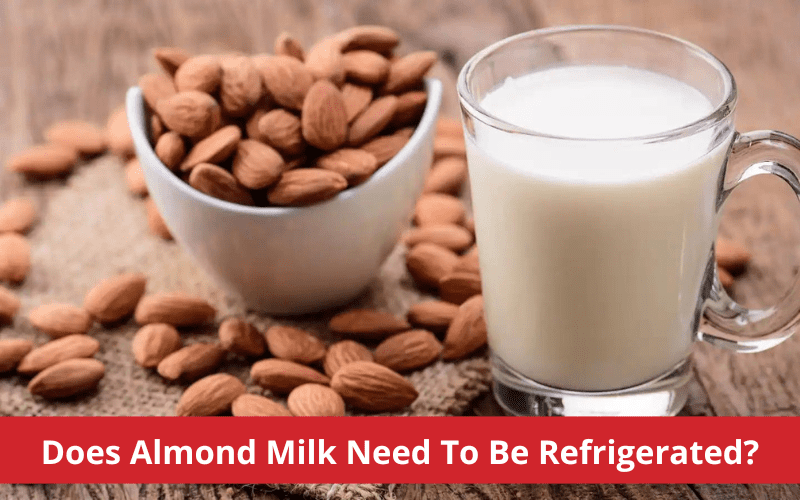Almond milk is a popular dairy-free alternative to cow’s milk, but there are some things you may not know about it. For example, did you know that does almond milk need to be refrigerated? That’s right! It has a long shelf life and can be stored at room temperature. In this blog post, we will discuss some other surprising facts about almond milk. We will also provide a few recipes for delicious dishes that you can make with this versatile ingredient.
Does almond milk have to be refrigerated?
Almond milk does not have to be refrigerated, but it is recommended in order to extend its shelf life. If left out at room temperature, almond milk will spoil after a few days. Almond milk can be stored in the fridge for up to two weeks or in the freezer for up to three months.
If some people supposed you don’t have to refrigerate almond milk?
Almond milk is a dairy-free, gluten-free, and vegan alternative to cow’s milk. It is produced by grinding almonds and mixing them with water. Almond milk contains high levels of vitamin E, magnesium, and potassium. It also has calcium and protein, but it does not have as much calcium as cow’s milk.
Some people believe that almond milk does not need to be refrigerated because it does not contain any harmful bacteria. However, most manufacturers recommend refrigerating almond milk to maintain its freshness.
Does silk almond milk need to be refrigerated?
It is not necessary to refrigerate Silk almond milk, but it can be stored in the fridge if you prefer. The milk will last for about seven days in the fridge or up to 30 days in the freezer. If you choose to freeze the milk, be sure to thaw it before drinking.
Does almond milk need to be refrigerated if not open?
Almond milk does not need to be refrigerated if it is unopened. However, after it is opened, it should be kept in the fridge and used within a week. Almond milk is a good source of calcium and vitamin D, and it has no cholesterol or saturated fat. It also contains less sugar than cow’s milk.
Is almond milk gluten-free?
There is some gluten-free almond milk on the market, but it can be hard to find. Most almond milk contains barley malt, which is a gluten-containing ingredient.
However, there are a few brands that make almond milk without barley malt. If you are looking for gluten-free almond milk, read the label carefully to make sure the product does not contain barley malt.
Does almond milk have dairy in it?
Almond milk is a dairy-free drink made from almonds. It is often used as a milk substitute for people who are lactose intolerant or have dairy allergies. Almond milk is high in calcium and vitamin D, and it has a creamy texture and a nutty flavor. It can be used in place of cow’s milk in most recipes.
How many calories are in almond milk?
Almond milk is a plant-based beverage that is low in calories and high in nutrients. A cup of unsweetened almond milk contains only 30 calories, making it a great choice for people who are watching their weight.
Almond milk is also a good source of vitamins D, E, and B12, as well as minerals such as magnesium and potassium. It is also high in antioxidants, which help to protect the body against disease.
Is almond milk vegan?
This is a question that often comes up when people are looking to transition to a plant-based diet. Almond milk is a dairy-free alternative to cows milk that is made from ground almonds and water. It is high in protein and calcium, making it a popular choice for those who are looking for a lactose-free beverage.
Many people believe that almond milk is vegan because it does not contain any animal products. However, some brands of almond milk do contain casein, which is a dairy protein. If you are looking for vegan-friendly almond milk, be sure to check the ingredients list before purchasing.
What are the benefits of drinking almond milk?
There are many benefits of drinking almond milk. For one, it’s a great source of calcium and vitamin D, which are important for maintaining bone health. Almond milk is also a good source of protein, making it a great choice for vegetarians and vegans.
It’s also low in calories and cholesterol-free, making it a healthy choice for people who are trying to lose weight or lower their cholesterol levels. Additionally, almond milk is a good source of antioxidants, which can help protect against disease.
Where can I buy almond milk?
Almond milk can be found in most grocery stores, and it is often refrigerated near dairy products. It can also be found in organic or health food stores, and sometimes it is located near other nondairy milk substitutes like soy milk or rice milk. Almond milk can also be ordered online from various retailers.
How do I make my own almond milk at home?
Making your own almond milk is a great way to ensure that you know exactly what’s in it. Almond milk is easy to make at home; all you need is a blender and some almonds.
Soak the almonds in water overnight. The next day, drain and rinse the almonds and put them in a blender with fresh water. Blend on high for about two minutes, or until the almonds are completely broken down.
Strain the almond milk through a fine mesh strainer into a pitcher or container. You may need to use your hands to help squeeze the liquid out of the almond pulp. Keep the almond milk in an airtight container in the fridge for up to four days.
What is the difference between store-bought and homemade almond milk?
Homemade almond milk is made from whole almonds that have been soaked in water overnight, then blended with water until smooth. Store-bought almond milk, on the other hand, is made from ground almonds that have been soaked in water for a shorter period of time, then strained to remove the pulp.
Both varieties of almond milk are high in protein and calcium, but homemade almond milk also contains dietary fiber, which is not found in store-bought almond milk. Additionally, homemade almond milk is less processed and contains fewer additives than store-bought almond milk.
Can I use almond milk in baking recipes?
Almond milk is a dairy-free, soy-free, gluten-free, and vegan-friendly milk alternative made from ground almonds. It is often used as a substitute for cow’s milk in baking recipes, as it has a similar consistency and taste.
Almond milk is also high in protein and vitamin E, making it a healthy choice for those with dietary restrictions or allergies. Some store-bought brands of almond milk contain added sugar and other additives, so it is important to read the ingredient list before purchasing. Homemade almond milk is easy to make using a blender or food processor.
How long does almond milk last once it’s opened?
Almond milk is a dairy-free alternative to cow’s milk that is made from almonds. It has a nutty taste and can be used in many of the same ways as cow’s milk.
Almond milk is available in both shelf-stable and refrigerated varieties. Shelf-stable almond milk is pasteurized and does not require refrigeration, while refrigerated almond milk is unpasteurized and must be kept refrigerated.
Almond milk lasts for about five days after it is opened when stored in the refrigerator. If it is stored in the pantry, it will last for about two weeks. Almond milk can be frozen for up to two months.
Is it ok to refrigerate almond milk after opening it?
As with any other food, it is generally safe to refrigerate almond milk after opening it. This is because once opened, the milk will start to spoil and grow bacteria if it is not stored in a cold environment. However, there are some exceptions to this rule.
For example, if you have left the milk at room temperature for an extended period of time, then it is best to discard it. Additionally, if you notice any signs of spoilage such as off-flavors or mold, then you should also discard the milk.
FAQs
Is almond milk still good after 7 days?
Almond milk is a dairy-free milk alternative made from almonds. It is high in monounsaturated fats, vitamin E, and magnesium. Almond milk is a good source of protein and has a lower calorie count than cow’s milk. It also contains no cholesterol or lactose.
Almond milk is available in both refrigerated and shelf-stable versions. The refrigerated version has a shorter shelf life than the shelf-stable version. However, almond milk is still good after 7 days if stored in the refrigerator.
Why does almond milk say to use it within 7 days?
There are a few reasons why almond milk might say to use it within 7 days. Almond milk is a dairy-free alternative to cow’s milk, so it doesn’t have the same preservatives that cow’s milk does. Almond milk is also a perishable food, meaning that it can spoil if not refrigerated properly.
Finally, almond milk is made from almonds, which are a type of nut. Nuts are high in oil, and this oil can go bad over time. When the oil in the almond goes bad, it can make the almond milk taste sour or rancid.
So, while almond milk will generally last for several days after the “use by” date on the package, it’s best to err on the side of caution and not consume any almond milk that’s been open for more than 7 days.
Why does almond milk go bad after a week?
Almond milk is a great dairy-free alternative to regular milk, but it does have a shorter shelf life. Almond milk will generally spoil within five to seven days after opening, so it’s important to use it up quickly.
- The main reason almond milk goes bad is that it contains high levels of water. This makes it more susceptible to bacteria growth, which can cause spoilage.
- Additionally, almond milk isn’t pasteurized like regular milk, so it doesn’t have as long of a shelf life. If you’re looking for an alternative to regular milk that will last a little longer, try soy milk or rice milk.
Does almond milk go bad after 2 weeks?
Almond milk is a dairy-free alternative to cow’s milk that is made from almonds. It has a light, nutty flavor and is often used in smoothies, coffee drinks, and baking recipes. Almond milk can be stored in the fridge for up to two weeks after opening.
What happens if you drink almond milk after 14 days of opening?
If you drink almond milk after 14 days of opening, it may not taste as good as when it was first opened. The milk may also start to spoil and develop a sour smell. Spoiled milk can cause nausea and vomiting.
Is almond milk OK after 5 days?
Almond milk is a dairy-free milk alternative that is made from ground almonds. It is often used as a substitute for cow’s milk and is high in protein, calcium, and vitamin D. Almond milk can be stored in the fridge for up to five days.
Conclusion
“Does almond milk need to be refrigerated?” – This was a hotly debated topic for a while, but the general consensus now seems to be that this dairy alternative can sit on your shelf without any adverse effects. So go ahead and stock up you’ll have one less thing to worry about when it comes time to pack your lunch or dinner for work.

